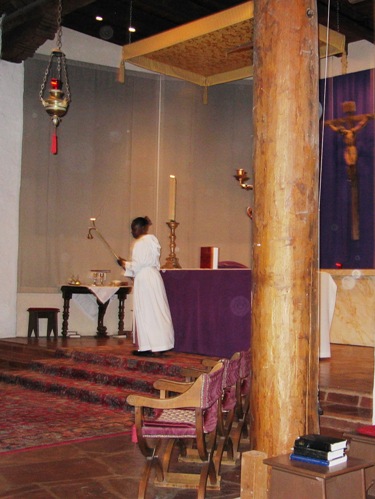Reprinted from Musings from Mavarin, Sunday, April 4, 2004
 When I was about six or seven years old, I used to hold my own little mass in what my family called the game room, the library-shelved, leftover furniture-filled finished room next to the basement, in which my mom met with her patients in private practice. I would put a purple towel on my mom's desk, set up a statue of Mary that my godmother had given me, and read through the Weekly Missal, very fast. I didn't quite credit, at that age, that it didn't count unless there was a real priest present, and that only men were priests. In those days, no women served at Mass at St. Ann's in Manlius, New York. Acolytes were called altar boys, and even the readers were male deacons at least.
When I was about six or seven years old, I used to hold my own little mass in what my family called the game room, the library-shelved, leftover furniture-filled finished room next to the basement, in which my mom met with her patients in private practice. I would put a purple towel on my mom's desk, set up a statue of Mary that my godmother had given me, and read through the Weekly Missal, very fast. I didn't quite credit, at that age, that it didn't count unless there was a real priest present, and that only men were priests. In those days, no women served at Mass at St. Ann's in Manlius, New York. Acolytes were called altar boys, and even the readers were male deacons at least.By the time I reached high school, some of the altar boys were girls, and there were lay readers, some of them women. I wasn't among them, although I still sat in a pew every Sunday. I was in my Jesus Person phase, illustrating a Jesus Christ Superstar album cover for art class with a somewhat graphic depiction of the crucifixion, singing songs from Godspell at Area All-State, going up to the front at the War Memorial when invited to do so by David Wilkerson protegé Nicky Cruz, where some disciple wrote down "H.S" as the reason I came forward. Despite everything, though, I didn't get what I was looking for, a little spark of feeling in my soul that I knew for sure to be God, waving and calling out, "I'm here. I'm real."
I kept looking for that through college. I went to church at St. Patrick's across town to see Father Ed Van Auken, who once said, "Theology's not my bag." I attended get-togethers at Newman House where a priest whose name I've forgotten preached against the Pill I was taking. I had long discussions about God with a close friend who wanted to be among the first female Episcopal priests, but who was rejected. I agreed less and less with the Catholic Church and the Creed. I wasn't sure what I believed any more, in something, certainly, but not in "the resurrection of the body." Then I married an agnostic, soon to be an atheist, who liked to say, "one man's religion is another's belly laugh." That was the end of my churchgoing, except for the occasional Christmas, for many years to come. If I didn't believe it, why go to church to say it?
Fast forward nearly 20 years, during which I hardly ever went to church, hardly ever looked at a Bible. In all those years of waiting for inspiration to hit, waiting to find out what I believed, I never really worked at it. I thought going to church and saying the creed would make me a hypocrite. I did, however, build a rather impressive collection of Madeleine L'Engle books, including a bunch of religious nonfiction. I've never read most of them, but I got the impression from what I did read that the Episcopal Church, a cathedral of which L'Engle attended, was worth a try. It seemed to have all the things I liked about the Catholic Church, and none of the stuff I didn't. That's an oversimplification, but it proved to be fairly accurate.
So I went to the church up the street from me, the one with a socially conscious sign out front. I've been going there ever since. It turns out that faith, for me, at least, is more a function of doing in public than of thinking in private. I was never going to find faith (much less prove anything to myself logically) by ignoring the subject most of the time, never going to church, never reading the Bible or any other books on the subject. I had to go to church, read the readings, listen to the sermons, think about the prayers, and maybe have a cup of ice tea in the Parish Center afterward. Once I started doing these things, I discovered that the Nicene Creed didn't bother me nearly as much at age 40 as it did when I was 20. I don't believe every word on a literal level, but I believe them on some level. And I learned that maybe there is a little spark inside me that says that God is there, God is real, even if I don't feel it every second, even if I don't understand, even if I don't know exactly what to believe.
These days I act as crucifer about twice every six weeks, and read to the congregation about once every ten weeks. I never quite get it right, somehow. When reading, I go a little too fast, or lose my place and blurt out, "Wait a minute...," or stumble over a word. Carrying the crucifix on a long pole near the front of the procession, I walk a little too fast, or too close to the thurifer (incense-bearer), or let the candles (candle-bearers) get ahead of me, or knock into something, especially outside before and after Mass. Up in the sanctuary, I forget to go get the stand for the readings, or to put it back, or to retrieve the cross during the prayer over the catechumen, until Proscovia nudges me or gives me a look or says my name. So I don't do it perfectly, ever, but I get by. Afterward I eat high carb food at coffee hour, and go home and update the church website at http://smaa/mavarin/com/smaa.html, or more likely just the schedule page.
Why do I forget to do what I'm supposed to do? I'm thinking about what I believe, or the parts of the ritual others perform, or the pain in my knees as I kneel during the Eucharistic Prayer. I'm trying to sing a hymn without the hymnal, because I never have one when I serve as crucifer. I'm wondering whether 98-year-old Eva's okay, because she didn't come to Mass, or she fainted, or she just stepped outside. I'm thinking about the readings, and the prayers, and the styles of the different priests and what they each have to say. I'm thinking about my novels, or my school work, or my stomach ache. So my mind wanders, until Proscovia nudges me or my mind wanders back on its own.
It's not good enough. I know it's not good enough. I'm not attentive enough. I still don't know exactly what I believe. I don't do much to save the world or feed the hungry. I don't have faith the size of a mustard seed.
But at night I go to bed and pray my repetitive, idiosyncratic prayers, full of gimme and give us and not at all full of praise, because I'm not good at it and don't know how to say it sincerely. I think about Heaven, which I neither understand nor reject entirely. And I talk to God, as I've always done. He never really answers, but I know he's there. He's real. He's listening. There's no ecstatic revelation, just a feeling, the same one I've always had.
And, because of Him, it is enough after all.
******* Update: 2005 ******
 It's been a year, almost, since I wrote this. Eva is 99 now, almost 100. I'm done with school. I've gotten better at being lector, and I don't make quite as many mistakes as crucifer. But really, overall, not much has changed. I haven't accomplished much this Lent, in terms or fasting or readings or special devotions. Nor have I learned anything much about my faith, such as it is. I still don't understand what Father Smith calls "the scandal of the cross." I don't understand the reason for what happened on Good Friday all those years ago. Oh, the human reasons - jealousy, politics, power, and sectarian disagreement - seem clear enough, but God's reasons remain obscure to me.
It's been a year, almost, since I wrote this. Eva is 99 now, almost 100. I'm done with school. I've gotten better at being lector, and I don't make quite as many mistakes as crucifer. But really, overall, not much has changed. I haven't accomplished much this Lent, in terms or fasting or readings or special devotions. Nor have I learned anything much about my faith, such as it is. I still don't understand what Father Smith calls "the scandal of the cross." I don't understand the reason for what happened on Good Friday all those years ago. Oh, the human reasons - jealousy, politics, power, and sectarian disagreement - seem clear enough, but God's reasons remain obscure to me.But I know that something happened, something that matters, something that resonates through 2000 years of translations and interpretations, of the same or similar words repeated so often that meaning threatens to slip away. It matters, whether or not I understand it, whether or not I'm clumsy or distracted.
And I pray that by next year, I'll understand why it matters and what it means, at least one percent better than I do now.
Karen










